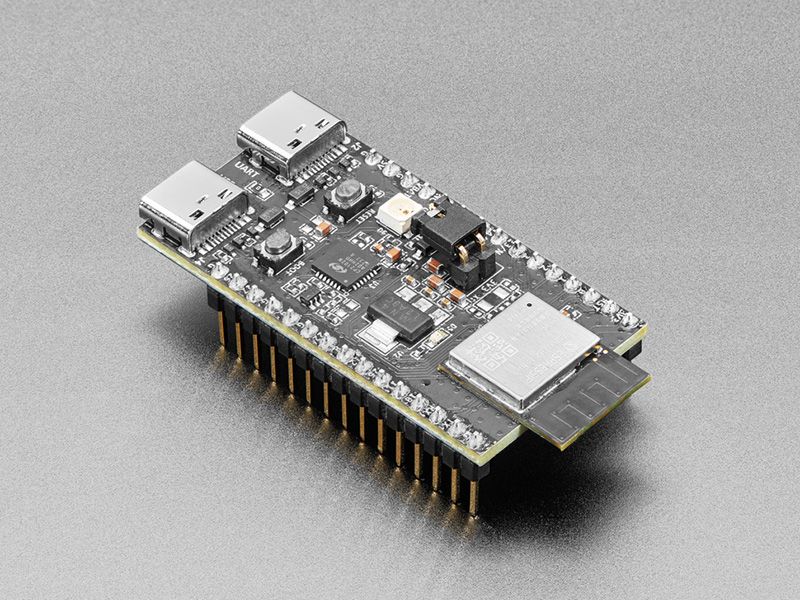
ESP32-H2-DevKitM-1-N4 by Espressif
ESP32-H2-DevKitM-1 is an entry-level development board based on Bluetooth® Low Energy and IEEE 802.15.4 combo modules ESP32-H2-MINI-1. Most of the I/O pins on the ESP32-H2-MINI-1 module are broken out to the pin headers on both sides of this board for easy interfacing.
Developers can either connect peripherals with jumper wires or mount ESP32-H2-DevKitM-1 on a breadboard.
ESP32-H2 is an ultra-low-power Internet of Things (IoT) solution offering multiple protocol support on a single chip. It integrates a 2.4 GHz transceiver compliant with Bluetooth ® Low Energy and IEEE 802.15.4-based technologies, supporting Bluetooth 5 (LE), Bluetooth mesh, Thread, Matter, and Zigbee. It has:
- A Bluetooth LE subsystem that supports features of Bluetooth 5 and Bluetooth mesh
- An IEEE 802.15.4 subsystem that supports Thread and Zigbee
- Radio protocols coexistence in 2.4GHz band
- State-of-the-art power and RF performance
- 32-bit RISC-V single-core processor with a four-stage pipeline that operates at up to 96 MHz
- 320 KB of SRAM, 128 KB of ROM, 4 KB LP memory, and 4 MB SiP flash inside
- Reliable security ensured by:
- Cryptographic hardware accelerators that support AES-128/256, Hash, RSA, HMAC, ECC, digital signature, and secure boot
- Random number generator
- Permission control on accessing internal memory, external memory, and peripherals
- External memory encryption and decryption
- Rich set of peripheral interfaces and GPIOs, ideal for various scenarios and complex applications.
Features:
- ESP32-H2-MINI-1: ESP32-H2-MINI-1, with ESP32-H2 inside which integrates a 2.4 GHz transceiver compliant with Bluetooth ® Low Energy and IEEE 802.15.4-based technologies, supporting Bluetooth 5 (LE), Bluetooth mesh, Thread, Matter, and Zigbee. This module is specially designed for all kinds of low-power IoT applications.
- Pin Headers: All available GPIO pins (except for the SPI bus for flash) are broken out to the pin headers on the board. For details, please see Espressif’s Header Block.
- 3.3V Power On LED: Turns on when the USB power is connected to the board.
- 5V to 3.3V LDO: Power regulator that converts a 5 V supply into a 3.3 V output.
- USB-to-UART Bridge: Single USB-UART bridge chip provides transfer rates up to 3 Mbps.
- ESP32-H2 USB Type-C Port: The USB Type-C port on the ESP32-H2 chip is compliant with USB 2.0 full speed. It is capable of up to 12 Mbps transfer speed (Note that this port does not support the faster 480 Mbps high-speed transfer mode).
- Boot Button: Download button. Holding down Boot and then pressing Reset initiates Firmware Download mode for downloading firmware through the serial port.
- Reset Button: Press this button to restart the system.
- USB Type-C to UART Port: Power supply for the board as well as the communication interface between a computer and the ESP32-H2 chip via USB-to-UART bridge.
- RGB LED: Addressable RGB LED, driven by GPIO8.
- J5: Used for current measurement. See details in Section Current Measurement.
Purchase
Contribute
Have some info to add for this board? Edit the source for this page here.
CircuitPython 10.1.1
This is the latest stable release of CircuitPython that will work with the ESP32-H2-DevKitM-1-N4. Use this release if you are new to CircuitPython.
Modules included in this download
_asyncio _bleio _bleio (native) _eve _pixelmap adafruit_bus_device adafruit_pixelbuf aesio alarm analogbufio analogio array atexit audiobusio audiocore audiomixer audiomp3 binascii bitbangio bitmapfilter bitmaptools board builtins builtins.pow3 busdisplay busio busio.SPI busio.UART canio codeop collections countio digitalio displayio epaperdisplay errno espidf fontio fourwire framebufferio frequencyio getpass gifio hashlib i2cdisplaybus io jpegio json keypad keypad.KeyMatrix keypad.Keys keypad.ShiftRegisterKeys keypad_demux keypad_demux.DemuxKeyMatrix locale lvfontio math microcontroller msgpack neopixel_write nvm onewireio os os.getenv ps2io pulseio pwmio rainbowio random re rotaryio rtc sdcardio select sharpdisplay socketpool.socketpool.AF_INET6 storage struct supervisor synthio sys terminalio tilepalettemapper time touchio traceback ulab vectorio warnings watchdog zlibFeatures: Wi-Fi, Bluetooth/BTLE, Breadboard-Friendly
CircuitPython 10.2.0-alpha.1
This is the latest development release of CircuitPython that will work with the ESP32-H2-DevKitM-1-N4.
Alpha development releases are early releases. They are unfinished, are likely to have bugs, and the features they provide may change. Beta releases may have some bugs and unfinished features, but should be suitable for many uses. A Release Candidate (rc) release is considered done and will become the next stable release, assuming no further issues are found.
Please try alpha, beta, and rc releases if you are able. Your testing is invaluable: it helps us uncover and find issues quickly.
Release Notes for 10.2.0-alpha.1
Modules included in this download
_asyncio _bleio _bleio (native) _eve _pixelmap adafruit_bus_device adafruit_pixelbuf aesio alarm analogbufio analogio array atexit audiobusio audiocore audiomixer audiomp3 binascii bitbangio bitmapfilter bitmaptools board builtins builtins.pow3 busdisplay busio busio.SPI busio.UART canio codeop collections countio digitalio displayio epaperdisplay errno espidf fontio fourwire framebufferio frequencyio getpass gifio hashlib i2cdisplaybus io jpegio json keypad keypad.KeyMatrix keypad.Keys keypad.ShiftRegisterKeys keypad_demux keypad_demux.DemuxKeyMatrix locale lvfontio math microcontroller msgpack neopixel_write nvm onewireio os os.getenv ps2io pulseio pwmio rainbowio random re rotaryio rtc sdcardio select sharpdisplay socketpool.socketpool.AF_INET6 storage struct supervisor supervisor.get_setting synthio sys terminalio tilepalettemapper time touchio traceback ulab vectorio warnings watchdog zlibFeatures: Wi-Fi, Bluetooth/BTLE, Breadboard-Friendly
Absolute Newest
Every time we commit new code to CircuitPython we automatically build binaries for each board and language. The binaries are stored on Amazon S3, organized by board, and then by language. These releases are even newer than the development release listed above. Try them if you want the absolute latest and are feeling daring or want to see if a problem has been fixed.
Previous Versions of CircuitPython
All previous releases of CircuitPython are available for download from Amazon S3 through the button below. For very old releases, look in the OLD/ folder for each board. Release notes for each release are available at GitHub button below.
Older releases are useful for testing if you something appears to be broken in a newer release but used to work, or if you have older code that depends on features only available in an older release. Otherwise we recommend using the latest stable release.
